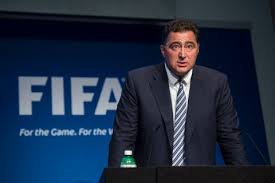By Andrew Warshaw
June 9 – Domenico Scala, the Swiss official who has emerged as the key figure spearheading reform at FIFA and orchestrating a smooth transition to the next president, has outlined the chain of events that led to him being plunged into the limelight when Sepp Blatter resigned.
In interviews with a number of Swiss newspapers, Scala, head of FIFA’s independent audit and compliance committee, said he received a phone call from FIFA secretary-general Jerome Valcke at 2pm last Tuesday, roughly four hours before Blatter’s shock announcement.
“The president wants to see you now,” Scala said Valcke told him, adding it was the first time that had happened. “It was obviously urgent.”
Scala rushed from Basel to Zurich and was informed by Blatter of his decision to step down. He immediately took the responsibility of addressing a hastily-arranged press conference once Blatter had made his statement.
One of the reforms recommended by Scala is three terms of a maximum 12 years for both the president and FIFA executive committee members. And even opening up the voting process for future World Cups so that “everyone can see who has voted for whom.”
“FIFA allows people to stay in position permanently. This leads to patronage and, ultimately corruption,” said Scala. “For example, three terms of four years, a maximum of 12 years, is enough for a FIFA president.”
“As chairman of the independent audit and compliance committee, I will work on and accompany reform proposals. The intention was to make this clear on Tuesday. This is about finding solutions to the main problem, that is, that for years, football has been abused by people around the world for personal gain. It’s not the first time that I have said this. However, it was important on Tuesday to make this clear once again.”
Scala says he will preserve his independence and not be influenced by anyone in his determination to bring about a smooth transition and organise the next election, due between December and March.
“I have the task of observing from an external standpoint how management of the company functions and of averting possible damages. In the current situation, I must indicate that the reforms need to be driven forward.”
But, he says, he certainly does not consider himself the main man at FIFA over the next few weeks and months.
“Not at all. I see myself as a kind of a catalyst for the necessary reforms. I can develop independent proposals but it is down to the Congress and the executive committee to approve these reforms. As the president is now stepping down and does not have to worry about his re-election, he can now fully concentrate on his legacy. My impression is that he considers these reforms his legacy.”
Scala is paying particular attention to the composition of the FIFA executive committee, and their roles.
“Some people wear multiple hats and therefore have different loyalties. The ExCo members’ conflicts of interest are the main problem. If one considers the blocks by the ethics committee in recent years, almost all cases can be traced back to individuals who sit in or sat in this body. The ExCo has evidently established a process with regards to its composition, which meant FIFA did not have a good selection. That must be changed.”
And so must term limits.
“What is key without a doubt is the introduction of term limits. Individual members of the ExCo have been in their positions for 20 or 30 years, or even longer. If one does something illegal and the other covers for him, this inevitably leads to dependencies in a system where there is no new blood. This mechanism must be broken.
“Secondly, there needs to be an integrity check by FIFA’s ethics committee because the confederations, which currently just carry out this check with a kind of self-declaration, will always be in a position of conflict of interests regarding this issue.
“Thirdly, the body is too big and therefore not effective enough. With 25 people, there is a large risk that unsuitable or incorrect individuals will be involved. Finally, the ExCo should decide to disclose individual compensation.”
Scala disagrees with the view in some quarters that Blatter should stand down now.
“I am in favour of an ordinary transition. That is always the best thing for an organisation. Additionally, I have observed in recent years who was for and who opposed institutional reforms and have to say that Mr Blatter was in favour and not against the reforms. It was other people who fought the reforms.”
Contact the writer of this story at moc.l1744972602labto1744972602ofdlr1744972602owedi1744972602sni@w1744972602ahsra1744972602w.wer1744972602dna1744972602

